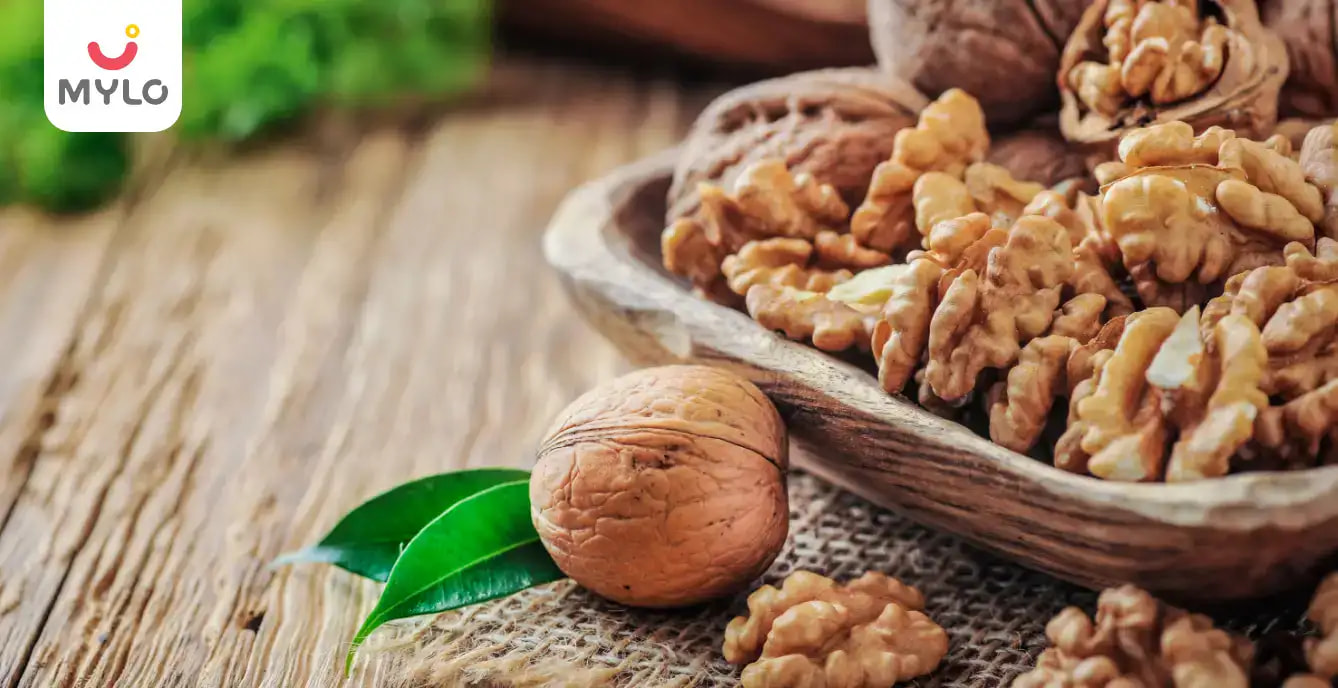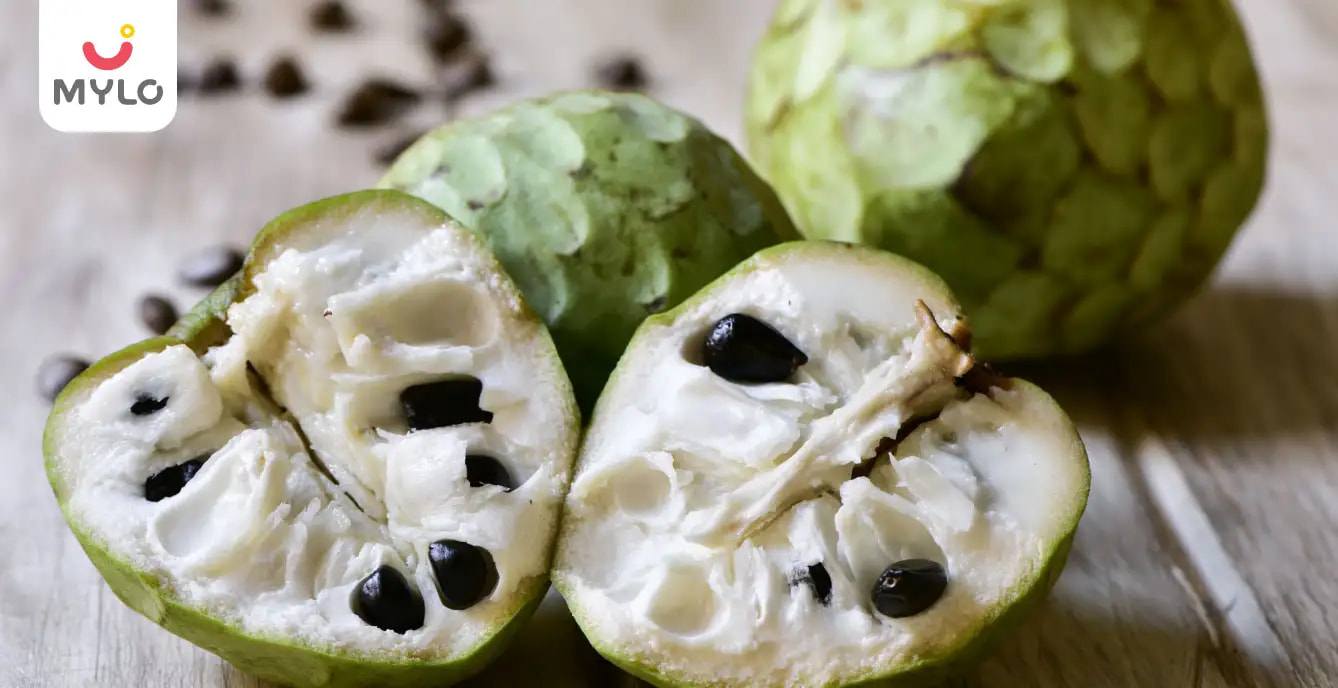Home

Diet & Nutrition

Benefits & Risks of Eating Walnuts in Pregnancy
In this Article

Diet & Nutrition
Benefits & Risks of Eating Walnuts in Pregnancy
Updated on 3 November 2023



Medically Reviewed by
Mayurakshi Kundu
diabetes, hypertension, obesity and also looked into pregnancy, lactation cases - Masters in Food and Nutrition
View Profile

Pregnancy is a crucial stage in a woman's life, and maintaining a healthy diet is essential for the well-being of both the mother and the unborn baby. While some foods are a definite no-no during pregnancy, there are others that can offer numerous benefits. One such food is walnuts - a delicious and nutritious nut that's packed with essential nutrients like omega-3 fatty acids, fiber, and protein. But with all the benefits come some potential risks. In this article, we'll explore the benefits and risks of eating walnut in pregnancy, so you can make an informed decision about adding them to your diet.
Is eating walnuts safe in pregnancy?
Yes, eating walnuts is safe during pregnancy, and it can be a beneficial addition to a healthy pregnancy diet. Walnuts are high in protein, fiber, and essential vitamins and minerals that can promote healthy digestion and regularity. In addition, regular consumption of walnuts during pregnancy has several benefits, including controlling high blood pressure and blood sugar, aiding in the development of the baby’s brain and eyes, supporting healthy weight gain, and enhancing immunity and gut health.
So, adding walnuts to your diet during pregnancy can be an excellent choice for both the mother and baby. On top of this, one can easily consume it in different ways, from munching it raw or using it to make smoothies, dry fruit ladoos, and many more. The recommended daily intake intake of walnut should be 3 to 4 kernels.
Nutritional benefits of walnut consumption during pregnancy
Before including walnut in pregnancy diet, it's important to know walnut benefits in pregnancy:
1. Rich source of omega fatty acids
One of the significant benefits of walnuts during pregnancy is their high concentration of omega-3 and omega-6 fatty acids. These are essential for the mother's cardiac health and the fetus's neural growth. For instance, it promotes the development of the meninges of the fetal brain, improving neural growth.
2. Loaded with magnesium
Walnuts are loaded with many minerals that have proven to be beneficial for pregnant women and the growing fetus and magnesium is one among them. Magnesium helps in the appropriate development and strengthening of the bones and cartilage in the baby.
3. High copper content
Walnuts have a high copper content that facilitates proper brain development and growth in the fetus. The copper content also promotes the formation of red blood cells in the fetus.
4. Packed with zinc
Besides magnesium and copper, walnuts also contain zinc, which can help reduce the chances of infections in pregnant women. As a result, one can avoid the chance of preterm labour, especially during the third trimester by consuming walnuts regularly.
Health advantages of eating walnuts during pregnancy
Now that you know the nutritional content of walnuts, it's important to know walnut benefits in pregnancy:
1. Regulates blood pressure and sugar
Walnuts contain antioxidants, healthy fats and several other beneficial plant compounds that help to control blood pressure and blood sugar levels during pregnancy. Regularly consuming walnut in pregnancy can thereby reduce the risk of gestational diabetes and high blood pressure.
2. Aids in fetal brain and eye developemnt
Walnuts are an excellent source of omega 3 fatty acids like alpha-linolenic acid (ALA) and folate, both of which help in the development of fetal brain and eyes. Additionally, consuming walnuts regularly can also keep up your folate requirements, which is key in preventing birth defects and complications.
3. Helps boost immunity
During pregnancy, the immune system of pregnant women is slightly suppressed, which increases their risk of infections during pregnancy. Walnuts are rich in immunity-boosting minerals and vitamins such as copper, phosphorous, folate, calcium, manganese and vitamins E and B6.
4. Promotes healthy digestion
Walnuts also promote the growth of healthy bacteria in the gut, which can help accelerate digestion and relieve some of the common digestive issues during pregnancy such as constipation, nausea and upset stomach.
5. Reduces bad cholesterol levels
Regularly consuming walnuts during pregnancy can also help reduce bad cholesterol levels and reduce the risk of heart diseases in the mother and her baby.
You may also like: Peanuts During Pregnancy: Is it Safe or Not
Including walnuts in your pregnancy diet
There are many ways in which one can introduce walnut in pregnancy diet. If anyone dislikes eating walnut raw without anything as a supplement, the following methods may help include this nut in the pregnancy diet with ease.
- Walnut kernels can be added to a smoothie, along with chia seeds, banana, and honey.
- Chopped walnuts can be added to homemade granola bars.
- It forms an excellent addition to beetroot or green yoghurt pudding.
- One can also extract milk from walnuts and add it to baked cookies.
- Walnut oil may be an excellent substitute for regular vegetable oil for cooking.
You may also like: An Expecting Mother's Guide to Following a Vegetarian Diet
Risks of eating walnuts in pregnancy
Walnuts are safe to consume during pregnancy and offer various nutritional benefits for both the mother and the baby. However, if a woman is highly allergic to nuts, even consuming a small amount of walnut in pregnancy can cause skin rashes, swelling of lips, and itching. It is always recommended to consult a doctor if there are any signs of an allergy or discomfort after consuming walnuts. Also eating too much of walnuts can cause diarrhoea and can also interfere with iron absorbtion therefore, it is important to eat walnuts in moderation during pregnancy.
Conclusion
In conclusion, eating walnuts during pregnancy can have a number of benefits for both the mother and the developing fetus, including improved brain function, better digestion, and better overall health. However, it is important to be aware of the potential risks associated with consuming large amounts of nuts, such as allergic reactions and gastrointestinal issues. As with any dietary changes during pregnancy, it is recommended to speak with a healthcare provider to determine what is best for both the mother and baby.
References
1. Gignac F, Romaguera D, Fernández-Barrés S, Phillipat C; et al. (2019). Maternal nut intake in pregnancy and child neuropsychological development up to 8 years old: a population-based cohort study in Spain. Eur J Epidemiol.
2. Sun B, Yan H, Li C, Yin L, Li F, Zhou L, Han X. (2020). Beneficial effects of walnut (Juglans regia L.) oil-derived polyunsaturated fatty acid prevents a prooxidant status and hyperlipidemia in pregnant rats with diabetes. Nutr Metab.





Medically Reviewed by
Mayurakshi Kundu
diabetes, hypertension, obesity and also looked into pregnancy, lactation cases - Masters in Food and Nutrition
View Profile


Written by
Roohi Kalra
Get baby's diet chart, and growth tips

Related Articles
Related Questions
Hello frnds..still no pain...doctor said head fix nhi hua hai..bt vagina me pain hai aur back pain bhi... anyone having same issues??

Kon kon c chije aisi hai jo pregnancy mei gas acidity jalan karti hain... Koi btayega plz bcz mujhe aksar khane ke baad hi samagh aata hai ki is chij se gas acidity jalan ho gyi hai. Please share your knowledge

I am 13 week pregnancy. Anyone having Storione-xt tablet. It better to have morning or night ???

Hlo to be moms....i hv a query...in my 9.5 wk i feel body joint pain like in ankle, knee, wrist, shoulder, toes....pain intensity is high...i cnt sleep....what should i do pls help....cn i cosult my doc.

Influenza and boostrix injection kisiko laga hai kya 8 month pregnancy me and q lagta hai ye plz reply me

Related Topics
RECENTLY PUBLISHED ARTICLES
our most recent articles

Diet & Nutrition
গর্ভাবস্থায় আলুবোখরা: উপকারিতা ও ঝুঁকি | Prunes During Pregnancy: Benefits & Risks in Bengali

Diet & Nutrition
গর্ভাবস্থায় হিং | ঝুঁকি, সুবিধা এবং অন্যান্য চিকিৎসা | Hing During Pregnancy | Risks, Benefits & Other Treatments in Bengali

Women Specific Issues
স্তনের উপর সাদা দাগ: লক্ষণ, কারণ এবং চিকিৎসা | White Spots on Nipple: Causes, Symptoms, and Treatments in Bengali

Diet & Nutrition
গর্ভাবস্থায় পোহা: উপকারিতা, ধরণ এবং রেসিপি | Poha During Pregnancy: Benefits, Types & Recipes in Bengali

Diet & Nutrition
গর্ভাবস্থায় মাছ: উপকারিতা এবং ঝুঁকি | Fish In Pregnancy: Benefits and Risks in Bengali

Diet & Nutrition
গর্ভাবস্থায় রেড ওয়াইন: পার্শ্ব প্রতিক্রিয়া এবং নির্দেশিকা | Red Wine During Pregnancy: Side Effects & Guidelines in Bengali
- ইনার থাই চ্যাফিং: কারণ, উপসর্গ এবং চিকিৎসা | Inner Thigh Chafing: Causes, Symptoms & Treatment in Bengali
- গর্ভাবস্থায় ব্রাউন রাইস: উপকারিতা ও সতর্কতা | Brown Rice During Pregnancy: Benefits & Precautions in Bengali
- Velamentous Cord Insertion - Precautions, Results & Safety
- Unlock the Secret to Flawless Skin: 7 Must-Have Qualities in a Face Serum
- Unlock the Secret to Radiant Skin: How Vitamin C Serum Can Transform Your Complexion
- Gender No Bar: 10 Reasons Why Everyone Needs a Body Lotion
- Unlock the Secret to Radiant Skin How to Choose the Perfect Body Lotion for Your Skin Type
- Top 10 Reasons to Apply a Body Lotion After Every Bath
- Communication in Toddlers: Milestones & Activities
- How to Improve Vocabulary for Toddlers?
- A Comprehensive Guide to Understanding Placenta Accreta
- Vulvovaginitis in Toddlers Causes, Symptoms and Treatment
- A Comprehensive Guide to Understanding Cerebral Palsy in Children
- Bitter Taste in Mouth During Pregnancy: Understanding the Causes and Remedies


AWARDS AND RECOGNITION

Mylo wins Forbes D2C Disruptor award

Mylo wins The Economic Times Promising Brands 2022
AS SEEN IN
















- Mylo Care: Effective and science-backed personal care and wellness solutions for a joyful you.
- Mylo Baby: Science-backed, gentle and effective personal care & hygiene range for your little one.
- Mylo Community: Trusted and empathetic community of 10mn+ parents and experts.
Product Categories
baby carrier | baby soap | baby wipes | stretch marks cream | baby cream | baby shampoo | baby massage oil | baby hair oil | stretch marks oil | baby body wash | baby powder | baby lotion | diaper rash cream | newborn diapers | teether | baby kajal | baby diapers | cloth diapers |








